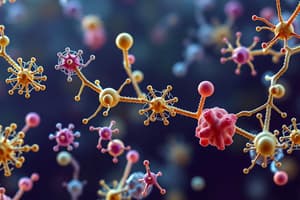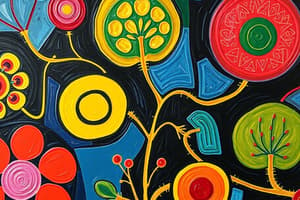Podcast
Questions and Answers
What is the primary focus at the molecular level of biological organization?
What is the primary focus at the molecular level of biological organization?
- Interactions between species
- Biomolecules such as DNA and proteins (correct)
- Cell structures
- Organs and organ systems
Which of the following accurately reflects the components of the cell theory?
Which of the following accurately reflects the components of the cell theory?
- Cells can spontaneously generate
- Cells arise from non-living matter
- All organisms are composed of cells (correct)
- The cell is a secondary unit of life
Which domain includes organisms that are often extremophiles?
Which domain includes organisms that are often extremophiles?
- Archaea (correct)
- Eukarya
- Bacteria
- Viruses
Which level of biological organization includes groups of individuals of the same species?
Which level of biological organization includes groups of individuals of the same species?
What does the term 'homeostasis' refer to in biological systems?
What does the term 'homeostasis' refer to in biological systems?
Which process describes the change in the genetic composition of populations over time?
Which process describes the change in the genetic composition of populations over time?
Which of the following correctly describes an organ system?
Which of the following correctly describes an organ system?
What is an example of an ecosystem?
What is an example of an ecosystem?
Flashcards are hidden until you start studying
Study Notes
Fundamental Concepts of Biology
- Definition: Biology is the scientific study of life and living organisms, including their structure, function, growth, evolution, distribution, and taxonomy.
Levels of Biological Organization
- Molecular Level: Focus on biomolecules (DNA, proteins, lipids, carbohydrates).
- Cellular Level: Study of cells, the basic units of life (prokaryotic vs. eukaryotic cells).
- Tissue Level: Groups of cells with a common function (e.g., muscle, nerve tissue).
- Organ Level: Structures composed of different tissues (e.g., heart, liver).
- Organ System Level: Groups of organs working together (e.g., circulatory, respiratory systems).
- Organism Level: Individual living beings.
- Population Level: Groups of individuals of the same species in a particular area.
- Community Level: Interactions between different species in an environment.
- Ecosystem Level: Communities interacting with their physical environment.
- Biosphere Level: Global ecological systems integrating all living beings.
Key Concepts in Biology
-
Cell Theory:
- All living organisms are composed of cells.
- The cell is the basic unit of life.
- All cells arise from pre-existing cells.
-
Genetics:
- Study of heredity and variation in organisms.
- Key components: DNA structure, genes, chromosomes, inheritance patterns.
-
Evolution:
- Change in the genetic composition of populations over time.
- Natural selection as a key mechanism for evolution.
-
Homeostasis:
- The ability of an organism to maintain stable internal conditions despite external changes.
-
Metabolism:
- All chemical reactions in an organism, including anabolism (building up) and catabolism (breaking down).
Classification of Life
-
Domains of Life:
- Bacteria: Prokaryotic, unicellular organisms.
- Archaea: Prokaryotic, often extremophiles.
- Eukarya: Eukaryotic organisms (includes animals, plants, fungi, and protists).
-
Taxonomic Hierarchy:
- Domain
- Kingdom
- Phylum
- Class
- Order
- Family
- Genus
- Species
Ecology and Environmental Biology
-
Ecosystems: Interactions between living organisms and their environment.
-
Food Chains and Webs:
- Energy flow through trophic levels (producers, consumers, decomposers).
-
Biomes: Large ecological areas with distinct climates and communities (e.g., desert, rainforest).
Cell Division
- Mitosis: Process of cell division resulting in two identical daughter cells.
- Meiosis: Process of cell division that produces gametes with half the chromosome number (haploid).
Major Biological Processes
- Photosynthesis: Conversion of light energy into chemical energy by plants.
- Cellular Respiration: Process by which cells obtain energy from glucose and oxygen, producing CO2 and water.
Importance of Biology
- Understanding life processes and their interactions.
- Applications in medicine, agriculture, environmental conservation, and biotechnology.
Fundamental Concepts of Biology
- Biology is the scientific study of life, encompassing structure, function, growth, evolution, distribution, and classification of living organisms.
Levels of Biological Organization
- Molecular Level: Focuses on the study of biomolecules like DNA, proteins, lipids, and carbohydrates, the building blocks of life.
- Cellular Level: Examines cells, the fundamental units of life. This level distinguishes between prokaryotic cells (lacking a nucleus) and eukaryotic cells (possessing a nucleus).
- Tissue Level: Groups of similar cells working together to perform a specific function. Examples include muscle tissue, nerve tissue, and epithelial tissue.
- Organ Level: Structures composed of different tissues that collaborate to perform a complex function. Examples include the heart, liver, and stomach.
- Organ System Level: Groups of organs that work together to carry out essential body functions. Examples include the circulatory system, respiratory system, and digestive system.
- Organism Level: Refers to an individual living being, a complete and functional organism.
- Population Level: Groups of individuals of the same species living in a particular area.
- Community Level: The interactions between various species within a specific environment.
- Ecosystem Level: Includes communities interacting with their physical environment, encompassing both biotic and abiotic factors.
- Biosphere Level: The global ecological system encompassing all living organisms and their interactions.
Key Concepts in Biology
- Cell Theory: Central to understanding life. It postulates that all living organisms are composed of cells, cells are the basic unit of life, and all cells arise from pre-existing cells.
- Genetics: The study of heredity and variation in organisms. Key areas of focus include DNA structure, genes, chromosomes, and inheritance patterns.
- Evolution: The process of change in the genetic composition of populations over time. Natural selection acts as a key mechanism driving this change.
- Homeostasis: The ability of organisms to maintain stable internal conditions despite external fluctuations. This is essential for survival and optimal function.
- Metabolism: The sum of all chemical reactions occurring within an organism. Metabolism involves anabolism (building up molecules) and catabolism (breaking down molecules).
Classification of Life
-
Domains of Life:
- Bacteria: Unicellular prokaryotic organisms, often found in diverse environments.
- Archaea: Prokaryotic organisms often found in extreme environments, possessing unique characteristics distinct from bacteria.
- Eukarya: All eukaryotic organisms, including animals, plants, fungi, and protists.
-
Taxonomic Hierarchy:
- Domain
- Kingdom
- Phylum
- Class
- Order
- Family
- Genus
- Species
Ecology and Environmental Biology
- Ecosystems: The complex interactions between living organisms and their physical environment.
- Food Chains and Webs: Represent the flow of energy through trophic levels, from producers (plants) to consumers (herbivores, carnivores) and decomposers (bacteria, fungi).
- Biomes: Large-scale ecological areas characterized by distinct climates and specific plant and animal communities. Examples include deserts, rainforests, and grasslands.
Cell Division
- Mitosis: A type of cell division that produces two identical daughter cells. This ensures the continuity of genetic information.
- Meiosis: A type of cell division that produces gametes (sex cells), each containing half the number of chromosomes found in the parent cell. Meiosis is essential for sexual reproduction.
Major Biological Processes
- Photosynthesis: The process used by plants and some other organisms to convert light energy into chemical energy stored in organic molecules like glucose.
- Cellular Respiration: The process by which cells extract energy from glucose in the presence of oxygen, producing carbon dioxide and water as byproducts. This process is essential for cell function and growth.
Importance of Biology
- Understanding biological processes and their interactions is crucial for addressing numerous global challenges.
- Biology plays a vital role in medicine, agriculture, environmental conservation, and biotechnology.
- It provides insights into human health, food production, and the preservation of biodiversity.
Studying That Suits You
Use AI to generate personalized quizzes and flashcards to suit your learning preferences.




